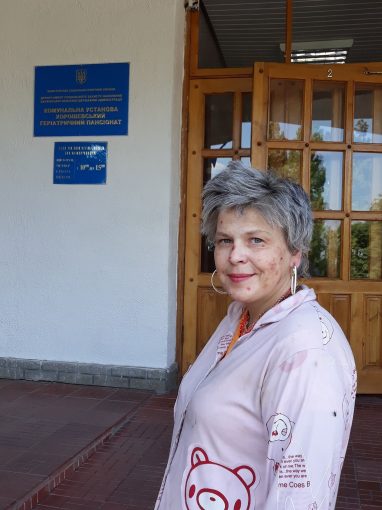
Depaul Ukraine first met Victoria in October 2016. She had been admitted to hospital in Kharkiv and was in an extremely vulnerable state. As well as having both legs amputated from the shin down, she was also suffering from severe mental health problems. She struggled to converse with the Depaul team, which made asking their usual questions a challenge. A conversation with Victoria’s doctors revealed that her legs were badly frostbitten and that she had none of her necessary identification documents.
The team in Ukraine immediately recognised the gravity of Victoria’s situation and set to work. They contacted the National Census Bureau to try and establish who Victoria was and what she may have endured. The team learnt that Victoria was registered to an address in Kharkiv. However, on arrival, all they found was a burned-out building with trees growing inside it.
Further investigation into Victoria’s situation revealed that her mother, whom Victoria had lived with, had passed away in unknown circumstances. Tragically, this had resulted in Victoria living with the body of the deceased for at least a week, perhaps more. Over the
next 12 months, the Depaul team regularly visited Victoria in hospital.
While she did not refuse their help of food and clothing, she never began to talk to them. The team respected Victoria’s decision and would continue to support her, never placing her under any pressure to interact with them in a way that made her uncomfortable.
In the meantime, the lengthy process of recovering Victoria’s passport, identification code, medical registration documents, and bank account, was ongoing. Finally, in July 2019, success! The team secured Victoria a new set of documents. They could now begin assisting Victoria in finding more suitable accommodation away from the hospital.
But there was nothing simple about Victoria’s situation. Victoria had a home but was homeless as it was unsafe for her to live there; she was not addicted to drugs or alcohol, a group often stigmatised, but people still judged Victoria; she suffered with severe mental health problems but was an independent person, capable of making her own decisions. In almost every sense, Victoria was in limbo, and her case required sensitivity and patience.
While the team pressed on, Victoria’s mental state started to worsen, and she began to harm herself. The team insisted that a psychiatrist visited the hospital to assess Victoria’s wellbeing. Following the consultation, Victoria was prescribed a new medicine.
From this moment, everything started to change for Victoria. She started talking to the team, and as she slowly built up trust, she began answering their questions. She agreed to use a wheelchair, and Depaul staff started to take her out on walks. With each outing, Victoria
smiled more; she grew in confidence and her sparkling personality shone. Victoria even began to sing and treated the team to a rendition of her favourite songs.
Having recovered her documents, Depaul staff enrolled Victoria in the state benefits scheme. On receiving her first payment, she bought a small radio and a set of headphones so that she could revive her love of listening to music. Shortly after, the team secured Victoria a place at a home for the elderly. Here, she could live out her days receiving the care that she required and with dignity.